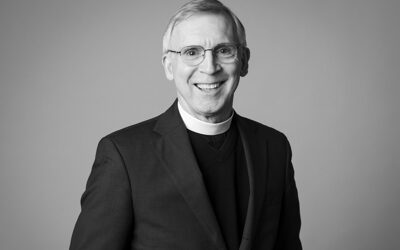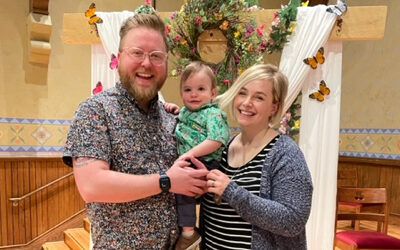Trinity Stories
All Jesus did that day was tell stories—a long storytelling afternoon. His storytelling fulfilled the prophecy: I will open my mouth and tell stories; I will bring out into the open things hidden since the world's first day.Matthew 13:34-35 – The Message
RECTOR’S BLOG
The Rev. Dr. Stephen Applegate
Election Day
Dear Friends,
Election Day is November 5, a week from Tuesday. I suppose a few people are unaware of this, but one would have to wonder under what rock they’ve been hiding.
Hyperbolic declarations of catastrophe around presidential elections are nothing new. The first bitterly contested election in US history was between John Adams – then Vice President – representing the Federalist Party and Thomas Jefferson – then Secretary of State – of what was called the Republican Party. The campaign quickly descended into mudslinging between the candidates’ supporters.
On October 1796, a mysterious editorial appeared in the Gazette of the United States, a popular Federalist newspaper in Philadelphia. The editorial said, in terms understood by most readers, that presidential candidate Jefferson was having an affair with one of his female slaves. Not to be outdone, Jefferson’s folks had been using their own strong campaign tactics in the fight against Adams. Adams was accused of wanting to be a king and starting a dynasty by having his son succeed him as President. He was also accused of being overweight and given the nickname “His Rotundity.”
So, if you are disturbed by the cataclysmic prospect that your candidate won’t be the one elected, or that one or the other candidate’s election means calamity for the United States, you have plenty of good company throughout the history of our republic. None of what I have written excuses you from voting, however (assuming you haven’t already cast your ballot). Our votes – every single one of them a privilege – represent our hopes and dreams for America.
Even though our votes are important – why else would candidates and parties spend so much money trying to garner them? – Americans are inconsistent voters. Only 37% of citizens 18 years and older voted in 2018, 2020, and 2022. Why the percentage is that low mystifies me.
The country’s votes are not the only ballots being cast this time of year. Trinity is also holding an election in early November – an election called the Annual Stewardship Drive – with pledge cards serving as ballots. Our pledges represent our hopes and dreams for this parish church. How we vote in the stewardship drive “election” determines the reach of our ministries in the coming year.
Ingathering Sunday is November 3. Please join me in making a generous pledge for 2025 – yes, I’ve pledged for 2025 in support of Trinity’s bright future under the leadership of your next rector. So many have worked tirelessly to strengthen the parish during the past year. Now it’s time to ensure that you all have the resources you need to continue the ministries to which God has called Trinity. Vote by returning your pledge by November 3 as we “prepare the way.”
Blessings,
Stephen Applegate
How does my pledge help “prepare the way”?
Trinity is asking for a pledge.
How does my pledge help “prepare the way”?
When this year’s Annual Stewardship Drive began, Trinity was a little bit more than a year into its transition from one rector to the next. Since last October, the Search Committee has been working steadily and faithfully to accomplish the tasks needed to find the right priest to join us as we share Christ’s light in downtown Toledo and beyond.
The Committee of eight parishioners – Karen Keune (Chair), Gail Abood, Mary Beroske, Angie Carriker, Mark Dubielak, LaVonda Jossett, Allen Santiago, and Sue Smitley – have put in more time, energy, and prayer into “preparing the way” than anyone else here at Trinity. However, that doesn’t mean that we don’t have a part to play. Every Sunday (and, hopefully, throughout the week) we pray for the transition – for God to send us a faithful priest who will love us and joyfully serve here. An increasing number of people have accepted a ministry beyond attending church services regularly. Folks are teaching Sunday School, planting the Plaza gardens, serving our neighbors at our weekly Community Breakfast, singing in the Choir, handling Altar Guild duties, planning Adult Formation, welcoming visitors, overseeing our buildings and grounds – the list goes on and on. Trinity is alive, active, and growing!
These are good things, because when a priest and parish come together, it’s the result of mutual discernment. The members of the Search Committee aren’t the only ones evaluating; candidates are also evaluating Trinity, asking questions like: how strong and active is the lay leadership? Are the buildings and grounds well-cared for, what’s the worship like? And does Trinity have the resources to do the ministry God is calling them to do?
It’s the answer to this last question that connects your pledge to the theme of this year’s pledge drive: “prepare the way.” A prospective rector wants to know if they’ll have to scratch hard to find the money to pay for ministry. A robust response to the 2025 pledge drive will let them know that the parish will have the resources needed in the new year. So, just as you have helped prepare the way by all that you are already doing, take one more step and make a pledge for 2025. When you do, you’ll do so knowing that the next rector is paying attention and will see that Trinity’s donors have “prepared the way” for an exciting new beginning.
What are some ways to satisfy my pledge?
Trinity is asking for a pledge.
What are some ways to satisfy my pledge?
Pledge, how do I satisfy thee? Let me count the ways (with apologies to the Bard of Avon):
Some of the typical ways
- Write a check and put it in the offering plate when you attend a Sunday service. For some people, the traditional approach is deeply satisfying and has lots of history behind it.
- Write a check, put it in a stamped envelope and send it to Trinity Episcopal Church, 316 Adams Street, Toledo, OH 43604. If you can’t get to church or will be away on vacation, let the US Postal Service take care of delivering your gift.
Some slightly less typical ways
- Set up an automatic transfer from your a) bank account (ACH transfer), b) credit card, c) debit card, d) PayPal. Call the parish office (419) 243-1231 or email heather@trinitytoledo.org if you need help.
- Go to the kiosk in the rear of the church & enter the information about how much you want to give and from what source
- Click on the QR code that appears in each Sunday service leaflet
- Text to give – (419) OMG-GIVE
Some unusual, but tax-advantaged ways
- Take a Qualified Charitable Distribution (QCD) for your Required Minimum Distribution (RMD). (Important disclaimer: talk to your financial advisor or accountant before deciding to give this way! And remember, the gift must be transferred directly from your account to Trinity or other charity.)
- Your QCD counts towards satisfying your RMD once you reach RMD age.
- Up to a maximum of $105,000 of your RMD can be donated to a qualified charity.
- If you have the RMD service, be sure to factor in these donations to avoid distributing more than your annual RMD.
- Qualified charitable distributions are counted for the tax year in which they’re taken.
- You may be able to avoid taxes on otherwise taxable distributions if you’re drawing from a traditional IRA.
- Transfer appreciated stock to Trinity. Here are four reasons:
- You can give more. By donating stock that has appreciated for more than a year, you are actually giving 20 percent more than if you sold the stock and then made a cash donation.
- You can potentially reduce future capital gains. Any appreciation of the value of a stock that you love and want to hold for the long term confirms your belief in it, but it can also set the stage for substantial gains when you sell.
- You can give your portfolio a health check. Any investment portfolio can get out of balance. If a review of your investments’ gains and losses shows that it’s time to rebalance your portfolio to maximize its performance and optimize for risk, donating stock can give your portfolio the health check it needs.
- You can donate stocks without headaches. Some people think it will require a lot of paperwork and phone calls to donate stock, or that their chosen charity may not be able to easily accept a stock donation. Trinity can help make such a transfer simple and easy. Just contact the parish office for more information.
At Trinity, we are grateful for every donation and have developed a number of convenient ways to give in support of God’s mission and ministry. We hope one of the ways listed above helps you give regularly and generously.
Trinity is asking for a pledge.
How much should I commit to give for 2025?
The first – and most important – answer to the question is to consider prayerfully what you are able to give. No one knows your personal circumstances better than you do, nor does anyone comprehend what your relationship is with Jesus and his church. We also want to acknowledge that people often have other important philanthropic interests. Every household has some idea what their total giving to charity could be on an annual basis – to the church, their alma mater, Heart Association, Audubon Society, The Nature Conservancy, NPR.
Having said this, some people find it helpful to think of their pledge as a percentage of their income. (And if you wonder whether we mean your net or your gross income – you get to choose!) The fact is that everyone who gives money to the church already gives a proportion of their income – they just aren’t aware of it. We think it’s better to know the percentage so you can actively think in such terms.
Let’s say that you earned $50,000 in 2024 and gave $1,000 to Trinity. Your pledge would be 2% of your income. Let’s take it a step further and say you received a healthy $10,000 raise, so your income for 2025 will be $60,000. If you sustained your giving at 2% of your income, your pledge will be $1,200. Of course, if your income decreases, proportional giving means that your pledge will decrease.
Here’s a handy chart that provides the information you need to determine what percentage of your income you are now pledging to Trinity. Can you sustain your gift at the same proportional level in 2025 – or, consider increasing your pledge by 1% of your income. Just find your income, and the block of your weekly gift, and move one block to the right!
COMMUNITY ENGAGEMENT
George Benson
Pop-Up Dinner Pot-Luck
Hello my fellow Trinity friends! There is a lot I could write about but, I think the most important thing for you to know is that this Sunday after service we are having a pop-luck lunch for those interested in hosting or joining a Pop-Up dinner group. Resurrecting...
Mother’s Day
Next week I’ll be back on my community engagement soap box, but this week I’d like to get vulnerable and share some memories. When I was about four or five, my family was living in Dayton Ohio, and during the fall my dad had a rare weekend off and we decided to go...
Pride is Nigh
My friends, it is the beginning of May which means Toledo Pride is only a few months away. With such a big, fun, and important event I’d like to start our planning on it sooner rather than later. I have spoken to many people who have been involved in Pride past, and...
Proud Dad Day
There are a lot of things I could write about this week, but I’m not going to because something personally special is happening. This Sunday 4/30, we will be baptizing our son Evan at Trinity. It is a day, truthfully, I thought would never come as we’ve had many ups...
MUSIC & THE ARTS
Chelsie Cree
Social media is not all bad. Promise.
Y’all, I love TikTok. If you haven’t downloaded it, and you are a music lover, you should. Some of you may bristle at even the mention of something like this, and I can’t blame you. We hear a lot about the negatives of social media. That it can be harmful, spread...
Music and Mother’s Day
This weekend is Mother’s Day, and one might ask what exactly I’m doing with/for my Mom this weekend. Maybe we’re preparing to get together on Sunday for a meal together. That there’s some sort of warm, heartfelt, hallmark movie kind of plan. Drenched in love, and...
Baking Competition May 28th!
There are many fun things about working at Trinity. I enjoy greatly the tasks that sit on the “fun” list each week. Music selection, choir rehearsal, and creating posters are some of my favorite things to do. And this week, I got to make a poster for the upcoming...
More Like Love
Good day, my fine friends. Have you ever had an experience where a song captivates you? For days? I find myself lucky to have those experiences. It isn’t always, but when it does happen, I am always thankful and usually a little surprised. When I find these songs,...









